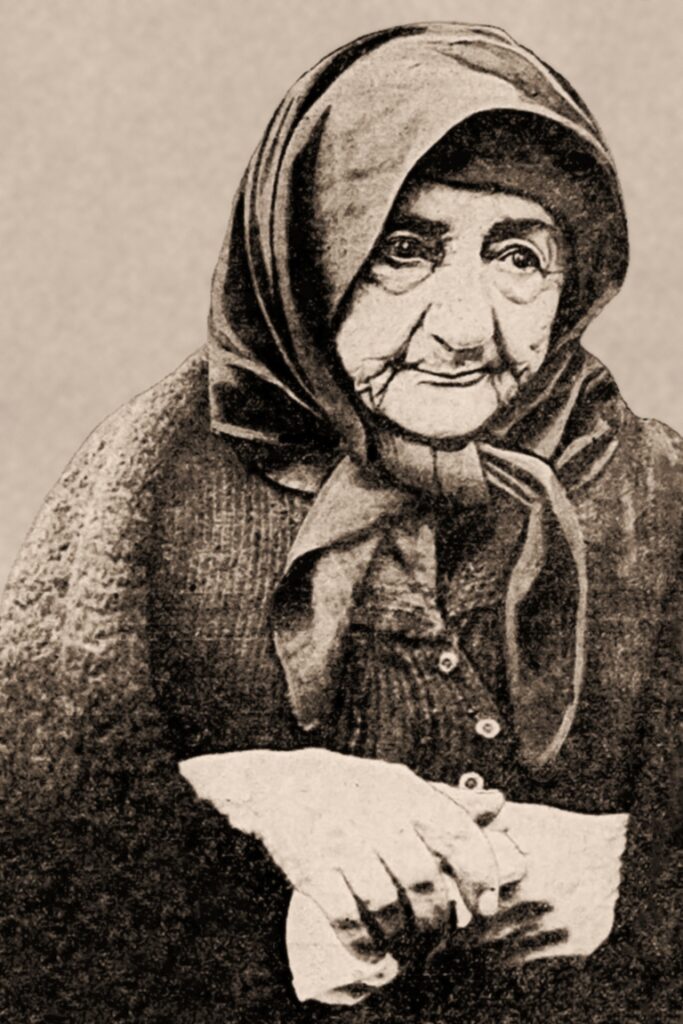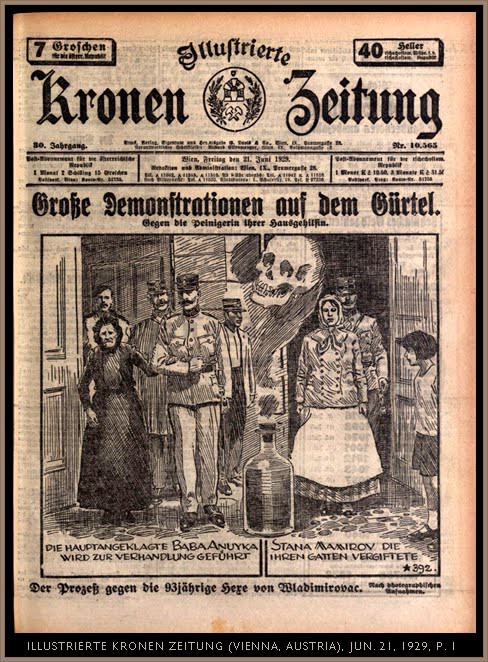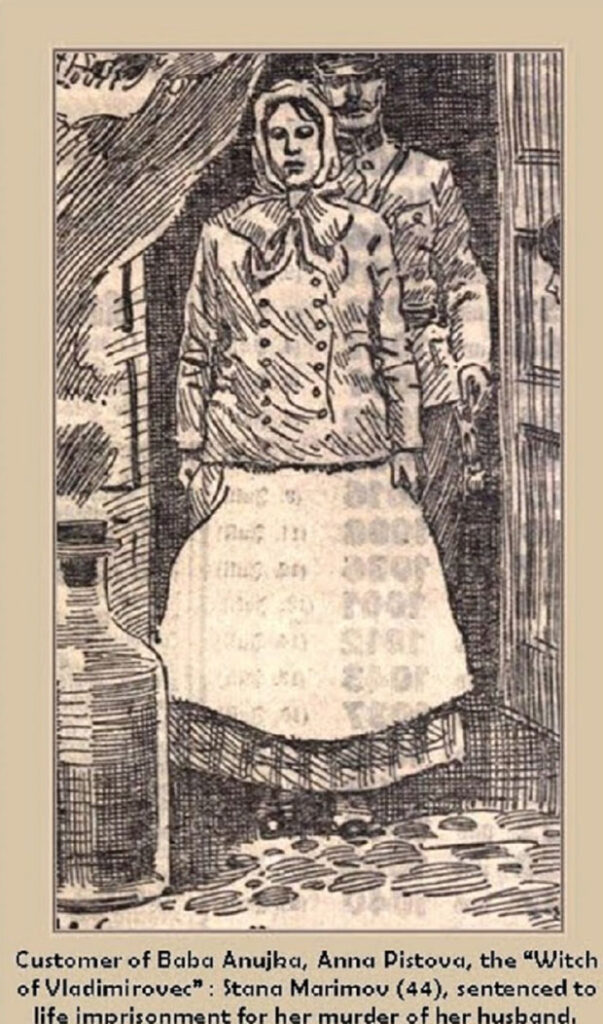
For today’s case we are going to Eastern Europe and back to the 19th century with the story of Ana Drakšin, more commonly known as Baba Anujka, one of the most prolific poisoners of late 19th-early 20th century Europe. Most sources say that Ana was born in 1838 in Wallachia, Romania, but when she was a young child her family moved to Vladimirovac, a small village in Yugoslavia.
Not a lot is really known about Ana Drakšin’s youth as records are incomplete or just missing as many are for that time period. What we do know is that when she was young, she lived in Yugoslavia. The family moved from Romania to Vladimirovac in 1848 when Ana was about 10 years old. Ana came from a well to do family because she attended a private school in Pančevo for the children of rich families. After finishing school, Ana returned to the family home in Vladimirovac.
In the 1850s this part of Yugoslavia was part of the Austro-Hungarian Empire, and it was in a frontier region so Austrian military forces were stationed in the area. At the age of 20, which would have been about 1858 Ana began a passionate love affair with an Austrian military officer. But the relationship was short-lived. Ana contracted Syphilis from him and then he left her shortly after. This left Ana absolutely broken hearted, and she became a misanthrope. She sought seclusion and threw herself into education particularly Chemistry and herbalism. She also learned five languages. At some point in her late twenties or early thirties her father arranged the marriage of Ana to a much older man. We don’t know his first name, but his surname was either Pistov or Pištonja.
The couple had 11 children, but only one of those children survived into adulthood. The one child who did survive went on to become a prosperous merchant sailor.
After about 20 years of marriage Ana’s husband died in the late 1880s/early 1890s.
Following her husband’s death, Ana converted a part of their house into a laboratory and she continued to study chemistry and herbalism. She became popular with local women who sought herbal remedies to a range of ailments, and she was able to earn quite a comfortable living.

As well as herbal remedies for farmer’s wives and other local women, Ana was very popular with the local men too. There was compulsory military service at the time and men would go to Ana to ask for something that would make them just ill enough so that they wouldn’t have to do their compulsory service.
But Ana wasn’t just concocting herbal remedies for the common cold and national service, she was also cooking up cures for marital problems, and not the marriage counselling kind of cures. She was making a more final, terminal kind of cure.
Yes, we’ve reached our old favourite, poison!
Ana made a special “love potion” which she sold to local women who were going through marital problems. Upon hearing from a woman that she was going through marital problems she would ask them “how heavy is the problem” which meant how much did the husband weigh. She would then calculate how much poison was needed and mix up a “love potion” of the appropriate strength. These potions were also called “Magic Water” and contained a cocktail of arsenic and plant toxins which were difficult to trace in an autopsy.
The women would give their husbands the magic water and in the large majority of cases the man would die exactly eight days later.
Ana began to get a reputation as a black widow and witch. She reportedly wore all black clothes and a black headscarf and sat by the window of her house watching the world go by.
She has been nicknamed the Witch of Vladimirovac and The Banat Witch. Along with her herbal remedies she also reportedly sold charms and talismans.
Locals supposedly didn’t know that there was poison in Ana’s various potions and treatments, instead believing that Ana had some kind of magical powers that killed their partners.
Ana went about her work undetected by authorities for decades. She was arrested and tried in June 1914 for providing poison to be used for murder but was ultimately acquitted and went back to her life as a harmless old lady mixing love potions and herbal remedies.
Her popularity continued to grow in the local area and by 1920 she even had her own “sales agent” Ljubina Milankov. From what we understand, Ljubina would essentially eavesdrop on women talking to their friends about their marital problems and direct them to Ana’s house where she would sell them her love potion and eight days after ingestion the troublesome husbands would die. People travelled from all over Yugoslavia to buy her magic water. Ana also worked on a sliding scale and would charge clients according to their income. Her magic water love potion retailed at anything from 2,000-10,000 Dinars or £20.54 – £102. We believe this exchange rate refers to 1920 when the Dinar stopped trading and if so, Baba Anujka’s magic water would cost nearly £900 – £4,600 today.
Now, if you want to be really generous you could claim that Ana wasn’t actually murdering anyone, sure she was supplying poison, but she wasn’t sneaking it into people’s food and drinks. But, an article from a Serbian newspaperclaims that one night she saw two men returning from a local dance. It was a hot night, so she went out and offered them each a glass of lemonade. A week later both men had died. Like most of her clients’ husbands the two men were relatively young, fit and healthy, not expected to just drop down dead one day.
If this story is true it kind of blows apart the idea of plausible deniability no matter how generous you’re feeling.
Ana’s downfall came in the mid-late 1920s when one of her repeat clients turned her over to the authorities. In 1924 she had sold her magic water to a woman named Stana Momirov who gave the potion to her husband Lazar Ludoški, and a few days later he died.
Stana got remarried to another local man, and a few months after the wedding her second husband’s rich uncle mysteriously died in exactly the same circumstances as her first husband. Stana was interrogated by the police and she quickly incriminated Ana.
In 1926 Ana sold her potion to Sima Momirov (no relation to Stana Momirov) and his wife Sofija. They intended to kill Sima’s 70-year-old father, Nikola Momirov, an alcoholic and abusive man. Sofija had heard about Ana from her friend Danica Stojić. It is unclear how Danica knew of Ana’s magic water, whether she was a client or had just heard about her on the local grapevine.
After Ana sold Sima and Sofija the potion in December 1926 they then gave it to 16-year-old Olga Sturza who was one of Nikola’s. They told Olga to make sure that her grandfather drank it all. 15 days after Nikola drank the magic water he died.
It was still another 17 months before Ana was arrested, but finally in May 1928, at the age of 90, she was arrested for the murders of Nikola Momirov and Lazar Ludoški. Stana, Sofija, and Sima Momirov, Danica Stojić and Olga Sturza, and her assistant Ljubina Milankov we also arrested.

The bodies of the two men were exhumed and examined at the University of Belgrade, which is now the capital of Serbia. A doctor testified at trial that there were traces of arsenic in both of the victims’ bodies. Samples were also taken from the potions and remedies found in Ana’s house to be tested, of course there was arsenic in amongst those potions.
Prosecutors sought the death penalty for all of the defendants except for Olga Sturza because she was a minor at the time.
Sofija and Sima Momirov defended themselves at trial. They claimed that they didn’t know that the “magic water” contained arsenic and that they believed that Nikola’s death was caused by Ana’s supernatural powers.
Stana Momirov claimed that her husband Lazar had been an alcoholic and that she had only wanted the magic water to cure him of his alcoholism and that she was not aware that it would kill him.
Olga Sturza also defended herself at trial, explaining that she was still a child at the time of the murder and that she was not aware that the water would kill her grandfather, it was just given to her by Sofija and told to give it to her grandfather. Sofija testified that Sturza was well aware of the whole plot.
Ana denied the charges, claiming that she never sold any kind of magic water. She blamed the deaths on Ljubina Milankov, claiming that she had been the one to mix and sell the poisoned water and she was just trying to shift the blame.
On July 6, 1929 Stana and Sofija Momirov were sentenced to life in prison as the main perpetrators in the murders, Sima Momirov was sentenced to 15 years for his part, and Ljubina Milankov to 8 years. Danica Stojić and Olga Sturza were both acquitted.
Ana was sentenced to 15 years in prison as an accomplice to both murders.
Both the defendants and the prosecutor appealed the sentences at the Appellate Court in Novi Sad, which is Serbia’s second city, in November 1929, with the prosecutor demanding capital punishment.
Stana and Sofija Momirov were both given the same sentence of life in prison, Sima Momirov was re-sentenced to life in prison, Ljubina Milankov’s sentence was increased to 10 years. Danica Stojić and Olga Sturza were once again both acquitted.
Ana was re-sentenced to 15 years with the addition of hard labour. She was 90 or 91 by this point.
We don’t know what happened to the rest of the defendants, we can only assume they served their sentences. Ana was released in 1936 on compassionate grounds due to her age. She died in 1938 in her home in Vladimirovac at the age of 100.
As well as the two murders she was convicted of assisting, estimates range from 50-150 victims, mostly men, who died after drinking Ana’s magic water love potion.
RELATED EPISODES:
10: Square Mile of Murder Poisoner
23: Black Widow Mary Ann Cotton
FURTHER READING:
Baba Anujka: The Alchemist of Vladimirovac (YouTube)
OUR NEW MERCH:
